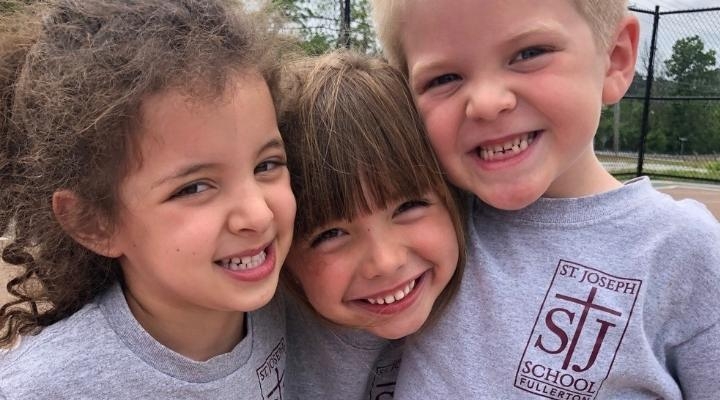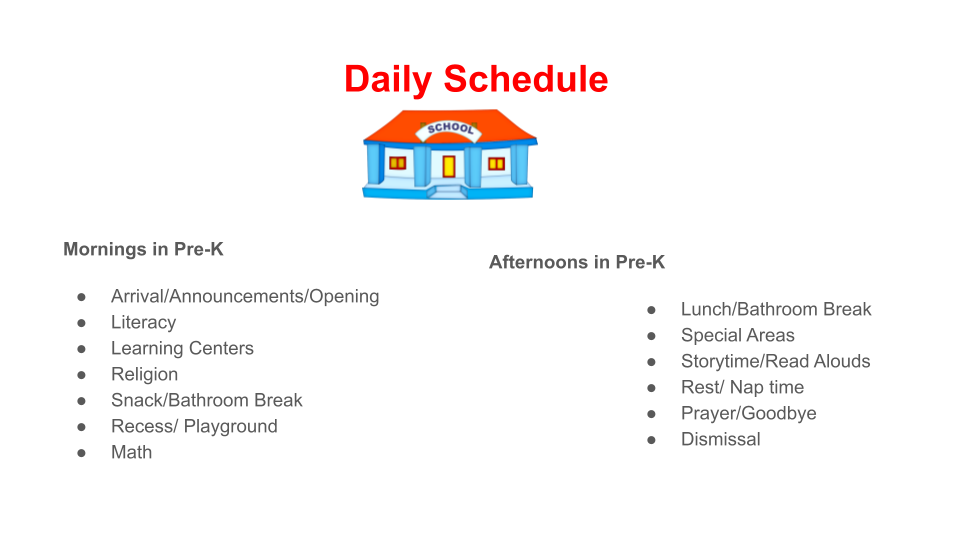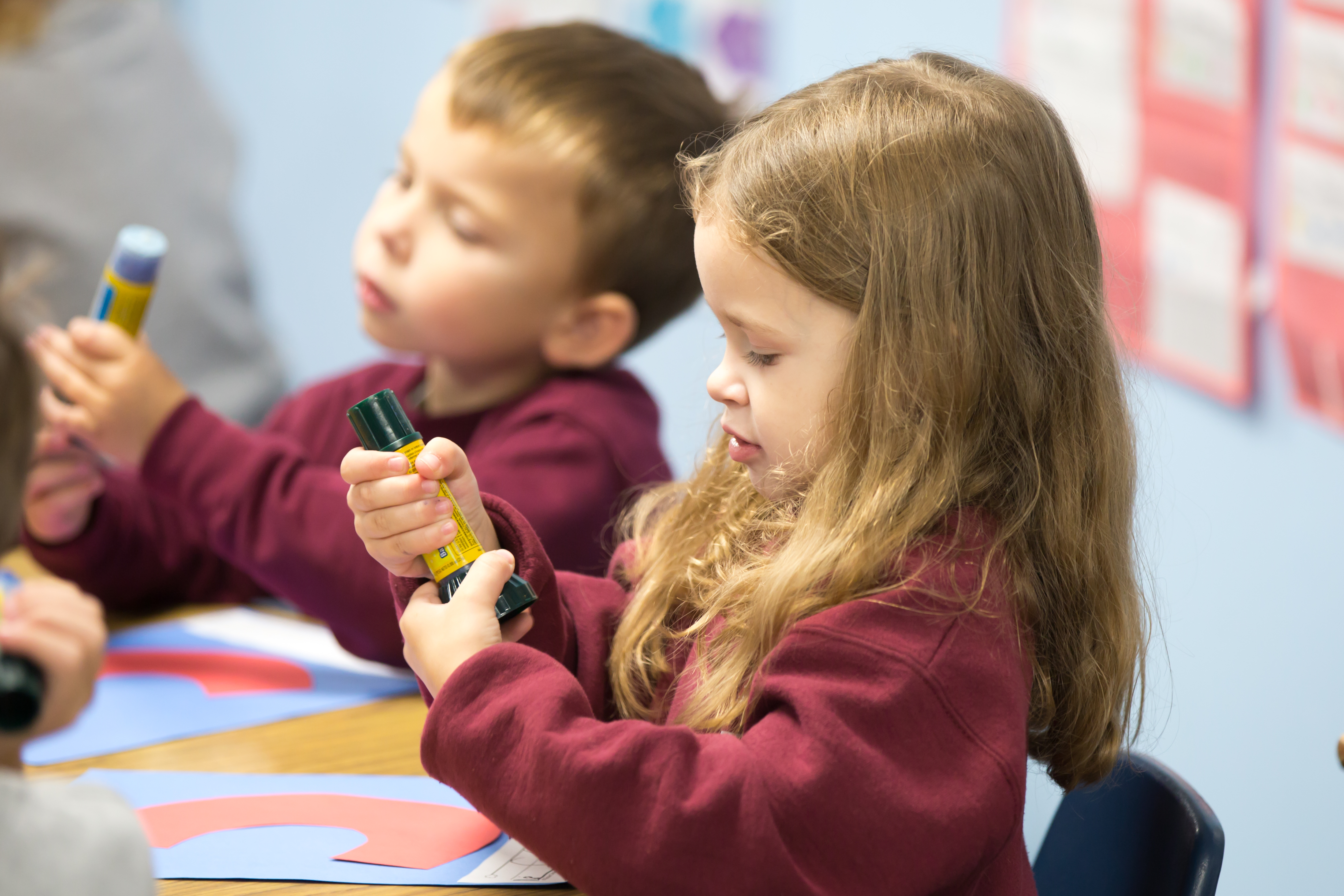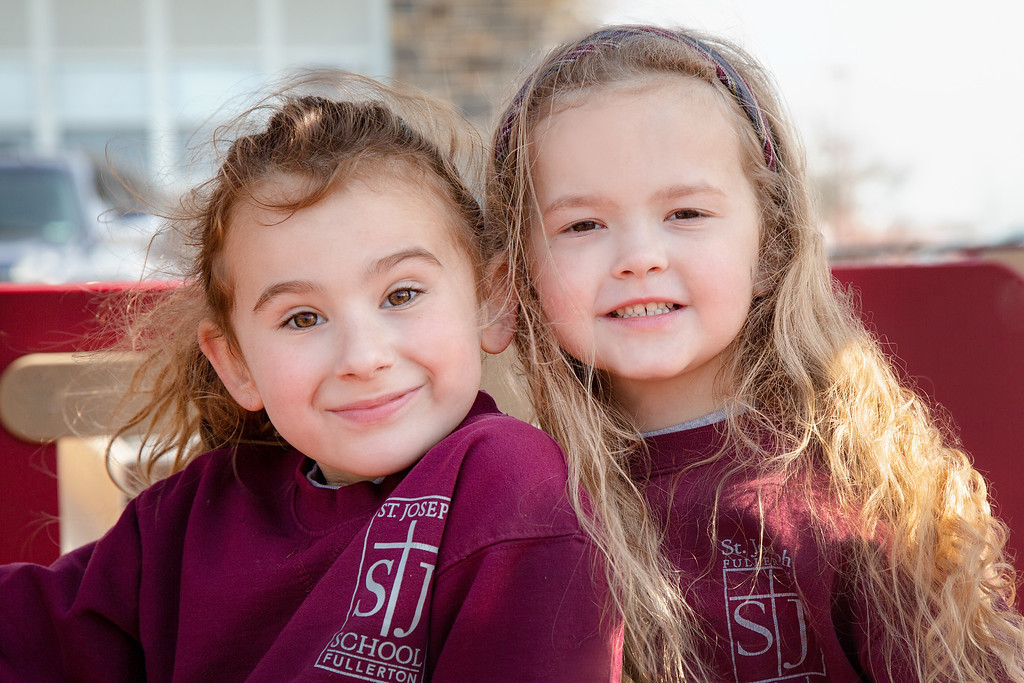
Preschool (PreK4)
Preschool (PreK4) Program Highlights
Your child is challenged to grow academically, spiritually, and socially in St. Joseph School - Fullerton's preschool (PreK4) program. Our curriculum follows the standards of the Archdiocese of Baltimore, which directly connects and aligns with the Maryland State Standards for preschool instruction. Our curriculum embeds Language Arts, Math, Science, Social Studies, and Religion into weekly units and themes. We use multi-sensory hands-on learning to teach fine motor skills and auditory and visual learning using center time, books, songs, technology, and art. Students also participate in Special classes (Art, Music, Physical Education, Technology, and STEM) one day a week.
What does preschool look like at St. Joseph School-Fullerton? Take the virtual tour:
As a parent, you choose the St. Joseph School-Fullerton PreK program, knowing that your child is participating in a preschool curriculum that prepares them for Kindergarten and beyond.
PreK-4 Program Schedule
Our preschool (PreK-4) program meets five days a week from 8:00 a.m. until dismissal at 2:35 p.m. Our two PreK-4 programs are staffed by caring, certified teachers and dedicated instructional assistants. Our preschool program aims to prepare your child for Kindergarten and become a lifelong learner. Students must be four years old by September 1st and independent when using the restroom.

Subject Areas
Below is a listing of the areas of study with example content and essential skills.
English Language Arts
The Reading and Language Arts program standards are based on the literacy standards provided by the Archdiocese, which focus on literacy, reading, and communication. Writing is also aligned with the state standards and taught through the Learning Without Tears curriculum.
Revised in 2014, the English Language Arts Curriculum for the Archdiocese of Baltimore is designed using the Catholic, College, and Career Ready clusters as its foundation. Through literature, this course of study fosters students' Catholic identity, shaping them to be models of Christian living for others. This curriculum is fully integrated with our Catholic faith. We provide students with a curriculum that is rigorous and rich in literature, oral and written language, grammar, writing, vocabulary, informational literature, and multimedia/technology.
By the completion of preschool, students will master a variety of skills, including:
- Exhibiting curiosity and interest in learning new vocabulary (e.g., asking questions about unfamiliar vocabulary).
- Describing the relationship between illustrations and the text in which they appear (e.g., what person, place, thing, or idea in the text an illustration depicts).
- They are actively engaging in group reading activities with purpose and understanding.
- Confirming understanding of a text read aloud or through other media by asking and answering questions about key details and requesting clarification if something is unclear.
- They are distinguishing shades of meaning among verbs describing the same general action (e.g., walk, march, strut, prance) by acting out the meanings.
Mathematics
Students use the Pearson EnVision Math program, which connects to the K-8 curriculum continuum, followed by St. Joseph School-Fullerton.
Revised in 2013, the curriculum for all elementary schools in the Archdiocese of Baltimore includes the following units:
Counting and Cardinality
Operations and Algebraic Thinking
Measurement and Data
Numbers and Operations in Base Ten
Geometry
Numbers and Operations
Catholic educators never forget that our schools exist to bring our students to Christ. By continuing to implement challenging new standards, we work to fulfill the promise of quality Catholic education that educates the whole child, both mind and soul. By the completion of preschool, students will master a variety of skills, including:
- Counting groups of objects to 10 to solve a problem
- Subitizing: immediate recognition of the number of a group without counting
- Manipulating actual, physical objects to represent the problem when working on a solution (e.g., apples to represent apples)
- Using measurement vocabulary when describing the attributes of objects
- Recognizing shapes in their real-world environment
Religion
Religion standards are followed through the Archdiocese of Baltimore and are taught through the Loyola Press resources and textbook/student workbook.
Released in 2011, “Bringing Good News” is the Archdiocese of Baltimore Religion Curriculum for Elementary Schools. This standards-based curriculum serves as a guide, a roadmap for both teachers and students as they embark on a journey that will provide them with knowledge and understanding of the faith as witnessed in the teachings and traditions of the Catholic Church.
The curriculum is built on the Six Tasks of Catechesis:
- Promoting Knowledge of the Faith
- Liturgical Education
- Moral Formation
- Teaching to Pray
- Education for Community Life
- Missionary Initiation and is aligned with the Assessment of Catholic Religious Education (IFG: ACRE)
By the completion of preschool, students will master a variety of skills, including:
- Identifying self and my family as belonging to God’s family
- Identifying the Bible as a special book about God
- Dramatizing the stories about Jesus from the Bible, i.e., The Last Supper, The Christ Child in the Temple, The Good Samaritan
- Demonstrating how we show our love by using kind words and positive actions
- Participating in prayer with the family, alone, in class, and at Church
- Identifying the saints as God’s special friends who are part of the family of the Church in heaven
- Discovering that God has made each of them special and that individual differences are gifts from God
- Understanding when we help our family and friends, we are showing love to others as Jesus did
Additional Subject Areas
While there are no defined standards in preschool for the following subject areas, Catholic schools offer exploration and introduction to the content that will be learned in future grade levels:
- Art & Music
- Instructional Technology
- Physical Education/Health
- Science
- Social Studies
- STEM
- World Languages


